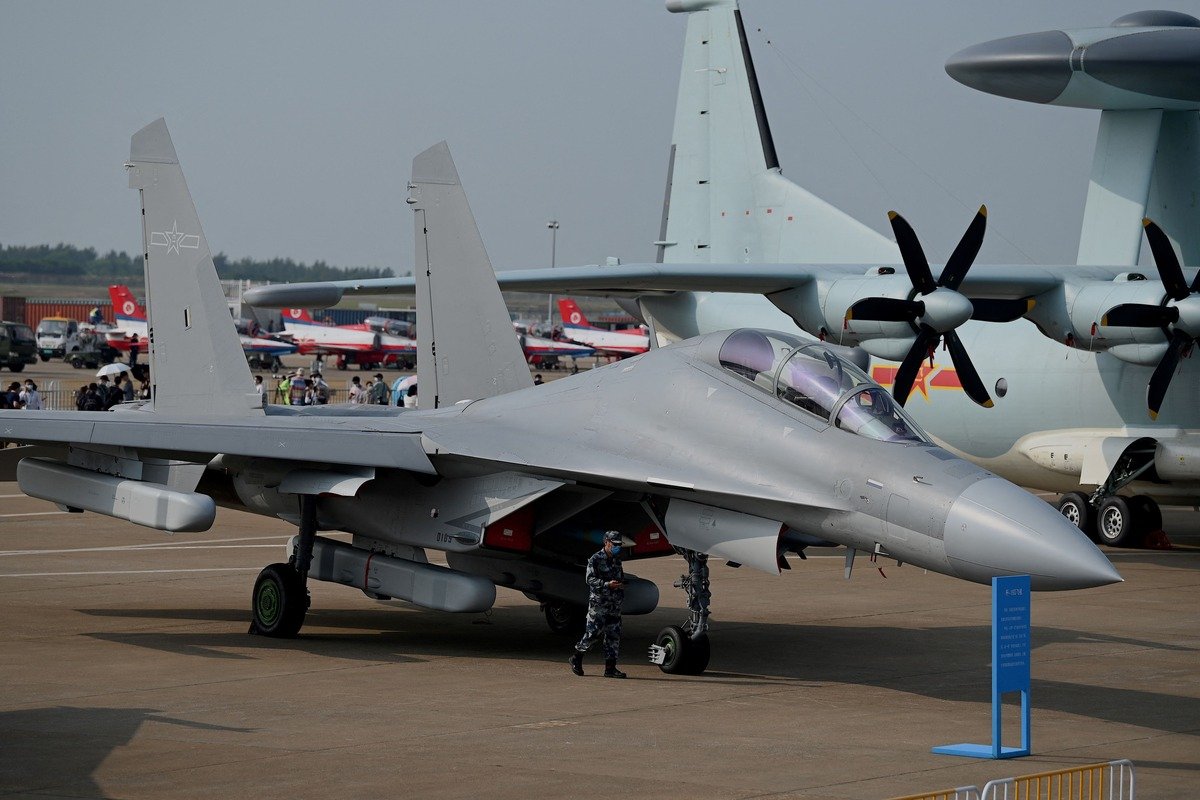Dramatic footage shows a Chinese fighter pilot executing an "aggressive maneuver" in front of a U.S. reconnaissance plane as tensions between the two countries mount.
The unclassified video, shared by the U.S. military on Tuesday, denounced a J-16 fighter pilot in Beijing's air force who "performed an unnecessarily aggressive maneuver during the intercept of a U.S. Air Force RC-135 aircraft," on May 26.
The pilot "flew directly in front of the nose" of the U.S. aircraft, and forced the reconnaissance plane to "fly through its wake turbulence," U.S. Indo-Pacific Command (USINDOPACOM) said. The incident took place in international airspace over the South China Sea, it said.
Tensions between Washington and Beijing have escalated in recent months, not least over China's belligerence towards Taiwan and the shooting down of a Chinese spy balloon earlier this year.

A senior U.S. defense official said there had been an "alarming increase in the number of risky aerial intercepts and confrontations at sea" by Chinese vessels and aircraft, according to reports.
The video released by USINDOPACOM shows the J-16 jet from inside the cockpit of the RC-135, with the Chinese aircraft passing in front of the surveillance plane. The camera then visibly shakes as the jet passes.
"The wake turbulence from the J-16 could have caused difficulties for the RC-135 beyond those seen in the video had the pass been closer," according to David Jordan, co-director of the Freeman Air and Space Institute at King's College London.
"I'd suggest that the aim is to harass the American aircraft and disrupt their flight path and potentially their operations," Jordan told Newsweek. "There is a risk of this going wrong, though."
The U.S. plane had been "conducting safe and routine operations over the South China Sea in international airspace, in accordance with international law," USINDOPACOM said.
"The U.S. Indo-Pacific Joint Force will continue to fly in international airspace with due regard for the safety of all vessels and aircraft under international law," it said, adding: "We expect all countries in the Indo-Pacific region to use international airspace safely and in accordance with international law."
"There seems to be a desire to prevent U.S. aircraft from going about their business in the area, even though they are in international airspace and entitled to do this," Jordan said. However, it is unlikely to dissuade the U.S. from operating in international air space, he added.
Chinese foreign ministry spokesperson, Mao Ning, said that the U.S. "has frequently sent aircraft and vessels to conduct close-in reconnaissance on China, seriously threatening China's sovereignty and security.
"Such provocative and dangerous moves are the root cause for maritime security issues," she added during a press briefing on Wednesday. "The US needs to immediately stop such dangerous acts of provocation."
In late 2022, USINDOPACOM said that a Chinese J-11 fighter pilot performed an "unsafe maneuver during an intercept of a U.S. Air Force RC-135 aircraft" on December 21.
The fighter jet flew in front of and within 20 feet of the U.S. aircraft, which took "evasive maneuvers to avoid a collision," the U.S. military said at the time, sharing footage of the incident.
Tuesday's statement and video comes as the U.S. Defense Department said the Chinese government had "declined our early May invitation" for Chinese Defense Minister Li Shangfu to meet with Defense Secretary Lloyd Austin in Singapore this week.
"The Department believes strongly in the importance of maintaining open lines of military-to-military communication between Washington and Beijing to ensure that competition does not veer into conflict," Pentagon Press Secretary, Brigadier General Pat Ryder, said.
On Tuesday, during a press briefing, Mao said: "The U.S. should earnestly respect China's sovereignty, security and interest concerns, immediately correct wrong practice, show sincerity and create the necessary atmosphere and conditions for dialogue and communication between the Chinese and US militaries."
Update 06/01/23, 6.35 a.m. ET: This article has been updated with comment from David Jordan.
Uncommon Knowledge
Newsweek is committed to challenging conventional wisdom and finding connections in the search for common ground.
Newsweek is committed to challenging conventional wisdom and finding connections in the search for common ground.
About the writer
Ellie Cook is a Newsweek security and defense reporter based in London, U.K. Her work focuses largely on the Russia-Ukraine ... Read more
To read how Newsweek uses AI as a newsroom tool, Click here.








